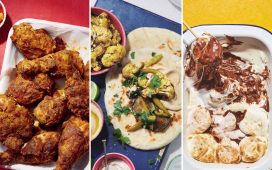After that evening in the restaurant, I began to combat the isolation by observing my husband’s eating habits. Once the food is on his plate he quickly devours it; his eating is efficient and rapid. This is the opposite of the way I like to eat, and it helped me understand what had happened at dinner that night. I realize now that the pace was too fast and the bites too large, not to mention the fact that the vegetables were mashed up with the potatoes.
This realization was just the first discovery in my never-ending journey of what it means to be fed by others, and how I’ve had to adjust. With each situation, there is also a confluence of emotions — often mutual discomfort or frustration.
People often forget about the fact that I need to eat or drink. They may also find it uncomfortable to feed me or simply get distracted. My friend loads up a forkful of chocolate cake and just when she is about to put it in my wide-open mouth, someone makes a joke or a conversation sparks. The buttercream-frosted delight hovers two centimeters from my face, wavering precariously. I keep my mouth open in anticipation, while my friend is drinking a glass of chardonnay and having a great time talking to other people at the table. She completely forgets that she is feeding me, and the night ends as a personal tragedy — I don’t get to enjoy my beloved chocolate cake. So close, and yet so far.
Getting the food into my mouth is just the beginning. A friend will do me the kindness of giving me hors d’oeuvres at a party. She wants me to partake, and she readies a huge piece of blue cheese on a crunchy piece of bread. It has everything I want — the smooth cheese with the rugged, thickly sliced bread, and the crunch! She asks, “Would you like some?” as she is already making a beeline for my mouth. I want the bread, I want the cheese, but I need a smaller bite. She is trying to do me a favor, and I don’t want to lecture her or be more of a burden than I feel I already am. I open my mouth, she inserts the bread with a smile and then wanders off to chat with the next person. I can’t manage to swallow the entire bite and end up dumping the half-eaten bread and cheese into my lap, in front of a room full of strangers. The scene is both hilarious and mortifying, a common combination in my life as a quadriplegic.
That is not to say that all of my experiences are this unsatisfying.
I was recently at a large family reunion. At the end of the event, everyone was saying their goodbyes and I was left sitting by myself, staring at the wall. People also forgot to ask if I wanted items from the dessert cart, which was passing me by. My young cousin noticed my plight and turned me around so that I could see the dessert cart and grabbed a collection of delights for me to eat. When he realized he might need to feed me, his eyes darted around the room looking for someone else, anyone else, to relieve him of that duty. Tentatively, he offered to feed me a bite of the dessert. Even though he clearly felt awkward and embarrassed that he didn’t really know how to feed me, his gesture made me feel loved and cared for, especially because this was totally outside of his comfort zone.
Because of my disability, I constantly worry if I am being too demanding when I eat. When I communicate how I want to be fed, I sometimes feel I am a burden, but I also feel that this communication is essential if I am going to be treated as a person who deserves to enjoy her food, her sanity. I wonder how other people feel, such as people with dementia or other disabilities, or how children who are nonverbal express their desires. This debate over the difference between want and need is a distinction many of us who require assistance wrestle with every day.
Regardless of my internal monologue, which I will probably have for the rest of my life, food means so much to me. I will never stop lusting for a good bite. At times, I still crave my chips and the privacy of my car, but I’m out in the open whether I like it or not. I have noticed the myriad ways to be nourished and the feelings associated with them all — frustration, humiliation, humor, joy and satisfaction. I’m slowly discovering what works for me and what doesn’t, as well as the new ways that I am forced to communicate in order to savor each flavor in concert with other people, when there is enough time, enough energy. And so I continue to explore new ways of communicating so that I can enjoy the pleasure of eating with others, while savoring each bite at my own pace.





